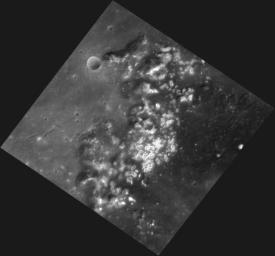This image, taken with the Narrow Angle Camera (NAC), shows an area of hollows on the floor of Raditladi basin. Hollows were first discovered on the surface of Mercury during MESSENGER's orbital mission and have not been seen on the Moon or on any other rocky planetary bodies. These bright, shallow depressions may have been formed by the loss of volatile materials. This same region has also been imaged in color.
This image was acquired as a high-resolution targeted observation. Targeted observations are images of a small area on Mercury's surface at resolutions much higher than the 250-meter/pixel (820 feet/pixel) morphology base map or the 1-kilometer/pixel (0.6 miles/pixel) color base map. It is not possible to cover all of Mercury's surface at this high resolution during MESSENGER's one-year mission, but several areas of high scientific interest are generally imaged in this mode each week.
Date acquired: January 02, 2012
Image Mission Elapsed Time (MET): 233984961
Image ID: 1213990
Instrument: Narrow Angle Camera (NAC) of the Mercury Dual Imaging System (MDIS)
Center Latitude: 26.60°
Center Longitude: 120.5° E
Resolution: 47 meters/pixel
Scale: This image is 73 km across (45 miles) from the left point to the right point.
Incidence Angle: 33.3°
Emission Angle: 22.0°
Phase Angle: 51.5°
The MESSENGER spacecraft is the first ever to orbit the planet Mercury, and the spacecraft's seven scientific instruments and radio science investigation are unraveling the history and evolution of the Solar System's innermost planet. Visit the Why Mercury? section of this website to learn more about the key science questions that the MESSENGER mission is addressing. During the one-year primary mission, MDIS is scheduled to acquire more than 75,000 images in support of MESSENGER's science goals.
These images are from MESSENGER, a NASA Discovery mission to conduct the first orbital study of the innermost planet, Mercury. For information regarding the use of images, see the MESSENGER image use policy.

 Planetary Data System
Planetary Data System












